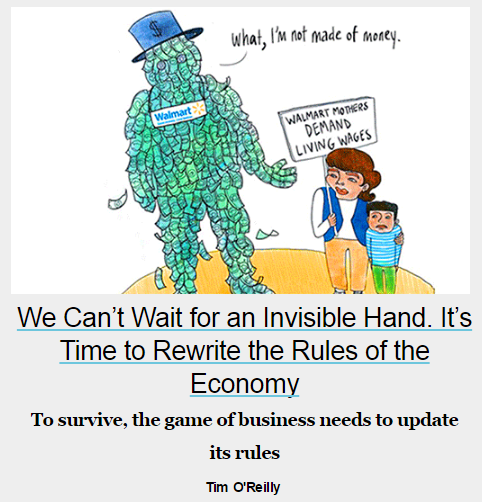Tagi
Austrian school, communism, David Sloan Wilson, economic blogs, economic philosophy, economic thought, evonomics, keynesianism, Leszek Balcerowicz, liberalism, nationalism, neoclassical school, new economic thinking, new economics, socialism, totalitarianism
A couple of months ago I subscribed to Evonomics. I felt instinctively that it might turn out to be a bit masochist for me, but still decided to give it a try.
Their autodescription:
Evonomics was launched in October 2015 (…). It seems to have a struck a nerve, rapidly attracting hundreds of thousands of page views a month.
They get on my nerves for sure due to excess simplifications, ignorance, sophomoric claims, antagonising attitude and repelling titles (which you will see below). All of this in the name of destroying the economic system as we know it and replacing it with a mirage built from wishlists involving fairness and equality. Evonomics embodies the new economic thinking where goals are clear, but means to achieve them remain blurred.
If you do not plan to read it from cover to cover and came here just for pictures, here is my summary of Evonomics’ major sins.
- Intellectual laziness. It is easy to challenge free market by attacking the concepts of Ayn Rand (one of Evonomics’ favorite topics: see here or here), the trickle-down theory or the libertarian buzzword of anarcho-capitalism and invisible hand. First, no serious economist (Alan Greenspan being the major exception) or institute espoused the philosophy of objectivism in earnest. Second, the trickle-down economics is the nonexistent concept kept alive solely by the critics of liberal thinking. Third, I dedicate this passage from Hayek’s „The Road to Serfdom”:
It is important not to confuse opposition against the latter kind of planning [plans made by the few omnipotent planners – M.S.] with a dogmatic laissez faire attitude. The liberal argument does not advocate leaving things just as they are; it favours making the best possible use of the forces of competition as a means of coordinating human efforts. It is based on the conviction that, where effective competition can be created, it is a better way of guiding individual efforts than any other. It emphasizes that in order to make competition work beneficially a carefully thought-out legal framework is required, and that neither the past nor the existing legal rules are free from grave defects.
It comes late in the text, so perhaps Evonomics’ editors fell asleep while in the first chapter, early enough to overlook it. The disgraceful aftermath is that Hayek is Evonomics’ number one foe. The second is Adam Smith, even more deceased, so to say.
On top of that, Evonomics is a spot where you will find a galaxy of unscientific, ahistorical and cliché terms, such as neoliberalism (Rutger Bregman even called Hayek a neoliberal!) or invisible hand.
- Negative economics. I was taught at school that economics divides into positive and normative. While positivists use objective facts to describe economic phenomena and draw causal relationships between them, normativists are judgmental and subjective. However, the implicit truth is that even normative economics seeks some form of affirmative advice that can be used by politicians or decision makers. Evonomics stays aloof. They are pioneers of negative economics. Their overarching goal is to discredit the theories (actual or imaginary) that have been introduced by the others. And so they fight fiercely against capitalism, individualism, human action, Reagan, Thatcher and the likes. What for? This we more or less are let to know – equal society and welfare state. What are the alternative means to reach it? No clue. No practical ideas capable of superseding the obsolete and criticized ones.
There is a strong affiliation to Keynesian thinking (on „About” page you start from reading a quote from Keynes) that may be felt in the air, but you will not see much of a hard evidence. Evonomics seems helpless in creating an original view on the economy’s current woes. It rather necrophilistically impeaches the input derived from dead economists of the Austrian or neoclassical current. What we receive as the audience is the irritating braggadocio produced by all-encompassing evangelists of negative economics. And spectators cheer and yell (not all – looking at the comments you will come across substantial polemic replies). Olympic games of hatred, not a blog you could reward with your attention in the long run.
P.S. Since Evonomics seems to be a marketplace of various ideas, I would suppress my criticism, but – for God’s sake – some form of „headquarter” surely reads the texts and approves them prior to publication, at least to draw these silly pictures illustrating each article! No mercy, then.
- Adjectivism. Evonomics apparently does not believe in the intelligence of its readership. Therefore, it frequently bundles the disliked nouns with a range of repulsive adjectives. So if you are not sure whether capitalism is right or wrong, no need to worry – Evonomics will eagerly tell you that it is parasitic, defunct or anything of that genre.
- Anectodalism. If you are a number-driven guy or at least like to see the underlying scientific evidence behind what you have just read, you will be disappointed. Quantitative reasoning is not the strong suit of Evonomics. References are rare. All in all, it is hell-yeah-new economics, right? So they sweep all economics up to date under the rug.
Short screening
Let’s exemplify. Below are several contributions published throughout the last couple of months and some notes of mine.
I do not know how deep did Lynn Parramore dig into medieval peasants’ chronicles, but it is somewhat naïve to tell Gen Z that not being born a tied-to-land tenant farmer in stinky and starving Lodomeria is actually a deficit of luck. Or is it really? Ms. Parramore forgot to tell us where did medieval peasants book their holidays and that shorter working hours applied to that 50% of peasants fortunate enough to survive infancy. If you happen to need a tangible evidence of abysmal ignorance, let’s refer to this headline. If „long live feudalism” is indeed your favorite lullaby, donate for startups that explore time travel.
The space between God’s work and anything useful is as wide as the ignorance of editors. I guess Wall St. would fit into this space as well as any other stock exchange doing ITS work of allocating PEOPLE’S (not society’s) money to assets.
No serious economist of this day and age (including all Austrians) believes in the invisible hand or trickle-down effect. It does not bother Evonomics’ contributors. They build up their hard-hitting stories by leveraging on these way too obsolete notions.
Surely, there is a historical moment for a massive economic debate, the new Methodenstreit, which should be much more inclusive than just for liberal or libertarian circles. Instead of it, what we are witnessing recently is the reinforcement of intellectual ghettos and the proliferation of the most lethal diseases of all times: communism and nationalism. While the latter awakens a number of top-tier critics, the first flourishes unstopped. Is it because it is considered less of a threat when juxtaposed with nationalism? I am afraid it is not taken as a threat at all.
Surfing through the web you may easily come across the webpages of communist parties, straight leftist propaganda or single-minded media. Evonomics, which pretends to be an agora, is in fact nothing more than one of these webpages.
I have mentioned the nationalist virus. So David Sloan Wilson, the renowned evolutionary biologist, stands up to fight it. But he does it from a completely wrong premise. He argues that national selfishness is no better than individual selfishness. Half true, as the problem is structured wrongly. Wilson, who has recently been known for pondering on the existence of altruism on 200 pages, defines selfishness (in case anyone has doubts, Wilson calls it BLATANT selfishness) or whichever term you want to use (self-interest, egoism etc.) an evil. By the same token, he extrapolates it to define nationalism as an evil. Nationalism is one, but not because it is the sum of individual selfishnesses. Personification of institutions is the wrong way. Contrary to what Wilson asserts, these are humans who are filled with feelings, not brick and mortar. Selfishness cannot be attributed to collective bodies. Anyway, it would have no chance for materializing, because selfishness is not compatible with collective bargaining where interests of individuals are in immanent conflict (even if they hold the same citizenship).
Side note. If you perceive a particular act as altruistic, think twice. It is probably not. What it is is at best well-camouflaged self-interest (it may even be unconscious). And there is nothing bad about it! The goal for the humankind is to wisely „pre-program” the incentives, so that individual self-interests of as many poeple as possible lead to socially desirable deeds. The first step to rid Evonomics’ editors of all the frustration they struggle with is to understand that people are selfish. And even if you believe in the very existence of altruism, most people are and will remain selfish. Now and ever. Live with it. Embrace it.
On such a venue, there is no way for the financial system to avoid bruises. I have read carefully „The Economy’s Hidden Illness – One Even Trump Failed to Address” by Rana Foroohar to find answer to the claim expressed in the subtitle: „How financial markets no longer support business, and thus, economic growth”. I have found none. Ms. Foroohar is right in providing evidence that the financialization has probably gone too far, but this does not infer in any way that the financial systems out of a sudden ceased to allocate money to promising investments. It just began to do a lot more on top of this. Seriously, let’s work on wording in titles!
The above is weird, as subtitle provides the answer to a hopeless title. Capitalism does not create jobs. I have never seen any ideology or strain of thought being able to mock human behavior. It is the people, stupid!
Why so shy. Prof. Steve Keen breaks the bank. „Economists Prove That Capitalism is Unnecessary”, he heralds. However, the word „capitalism” does not appear throughout the article. The „economists”, whose names appear in the text are Walras, Keynes, Hayek and Muth. To the best of my knowledge, none of them has ever written anything remotely congruent with the statement put in the title. However, Mr. Keen proudly goes on reinterpreting their quotes. The text itself is not bad or inaccurate, it just does not deliver on promise to trample down capitalism.
I am not an opponent of the idea of basic income. In fact, I believe its implementation will be unavoidable at some point in the future because of structural unemployment induced by automation. But listen to the justification provided by Tom Streithorst. He says that capitalism’s fundamental problem is lack of demand. Manufacturing is strikingly easy, but there is no way producers can sell their output („even though a robot can make an iPhone, it cannot buy one”). What does it mean? Apparently, these bloody consumers became awfully selective. Paradoxically, this is the most pro-business text I have found in Evonomics. The corollary for the supply side is: „even if you are a manufacturing sucker who is not able to sell his cup holder umbrella, don’t worry – we’ll give resources to your ungrateful consumers to buy this crap from you”. Creative destruction? Technological advancement? Blue Ocean Strategy? Price wars? Forget about it. Welcome to the new world, where crap is king!
But this is not over, move on! Evonomics’ contributors do not only put basic income back in the limelight (the prototype of it has been under President Nixon’s consideration as early as in 1969). Oh no. They already know how to pay for it!
In an article „How to Pay for Universal Basic Income” James K. Boyce and Peter Barnes argue that corporations should pay for using universal assets (nature, financial infrastructure, legal infrastructure). What does it mean in practice? You are right, taxes: transaction tax, fees on patent and royalty earnings etc. „It would not be difficult to create a portfolio of universal assets that could pay, say, $200 a month to every U.S. resident with a valid Social Security number”, they say. Wise men. If I were a private equity manager I would keep an eye on these two, future stars of asset management. Seriously. We say in Poland the sweetness of a cup of tea is not related to the amount of stirring. What the gentlemen from the University of Massachusetts Amherst want to do is to stir hard, but their idyllic mechanism is a synonym of raising taxes and it is unlikely to generate any extra money in the economy.
This is the one I did not even dare to click. Seriously, where did they go for title-building classes? I do not like Friedman. Actually, I find his views (on measuring the validity of economic models by their ability to predict the future) particularly harmful to the body of economics. But come on! „Psuedo-science”? „Economists Should”?
Disrespecting Milton Friedman is not enough. It takes vaccination against Hayek to win readership’s admiration. One of the most fertile mind of the 20th century portrayed as a monster? What would you expect after clicking the above picture? Well, it turns out that Wilson holds at least ambivalent esteem for Hayek’s work. He criticizes him mainly on the basis of… a cartoon version of „The Road to Serfdom” that was published by the General Motors Corporation in Look Magazine in 1945! Yes, exactly. Hayek himself admitted that „The Road to Serfdom” (the actual one, not the cartoon) is a political book, but it is primarily a memento against totalitarianisms. Be careful when playing with these devils. Be careful when saying „Hayek’s predictions in The Road to Serfdom proved to be entirely wrong”, as chances are you are saying in too light-heartedly and too prematurely given the current political outlook. Nevertheless, just in case, Wilson takes this opportunity to usurp some of Hayek’s glory by saying: „Some have even described me as a modern-day Hayek in my approach to economics”. I wonder who have been these „some” jesters thinking that Hayek would need his modern-day counterpart. So double-faced, Mr. Wilson, so gross.
Note that the article (after a couple of sentences that are meant to depict Hayek as a monster) concludes with self-promotion: „If you follow up on any article in Evonomics, you’ll find that it’s anchored in good science”, „Evonomics is a monster-free zone”, „In my next essay, I’ll discuss what Hayek got right about evolution and complexity”. Oh… Thank you, I think I have had enough of this enlightment.
The good thing
The good thing is that Evonomics is the marketplace of ideas and sensible voices are heard from time to time, though they do not constitute the main line. Look at the names. A software engineer and blogger, Dustin Mineau, is kind enough to differentiate capitalism from rent-seeking (deriving unearned income) in his article: „How Economists Duped Us into Attacking Capitalism Instead of Parasitic Rent-Seeking”. Fair. A regular MSc, Amna Silim, presents alternatives to neoclassical economics in „What is New Economic Thinking?”. Descriptive and not very fresh, but OK. No surprise that the scientific rigor is evident in „Finance Is Not the Economy” by Dirk Bezemer and Michael Hudson, as the article was originally printed at the „Journal of Economic Issues”.
Even David Sloan Wilson made a good job by paying tribute to Elinor Ostrom and recounting her groundbreaking work on the commons.
These passages are promising, for we surely need the paradigm shift in economic sciences, but not the one that majority of Evonomics contributors try to suggest.
Epilogue
The communism revives, it is a fact. As Leszek Balcerowicz rightly asserts, being a communist in a capitalist reality is very lucrative. One may sell a lot of books. It did not work well the other way round, as communist states once had some issues with tolerating different views on economy (some pictures of imprisoned kulaks would fit here, but I am afraid their cruelty may not correspond well with the goofy images of Evonomics ignorants).
The Institute of New Economic Thinking, financed i.a. by George Soros, is another institute I am aware of where similar strain of thinking is promoted. There are surely many others I am not familiar with. At the end of day, it affects societies that pump up demands and breed belief in governments’ unlimited power, and politicians who become increasingly responsive to these claims. The contemporary generation of communists is not made of peasants and blue collars. But it is again full of lofty unrealistic ideals, confidence and hubris.
The sad rebound of this environment is not only that communist points of view triumph, but also that the outstanding individuals suffer from incessant attacks and defamation. In Poland, it applies to Mr. Balcerowicz (currently one of the advisers to Ukraine’s president), globally to figures like Ms. Thatcher, after the death of whom radio broadcasters worldwide aired „Ding Dong The Witch is Dead”. On a good note, the breadth of supporters’ circle does not measure the calibre of an individual. Therefore, I believe that Thatcher and Hayek, though rolling in their graves, are just happy from the seeds they have planted in these minds that are capable of cultivating them.
What we, liberals, are left with is the power of individuals, the human action and the belief that „pride goeth before destruction, and an haughty spirit before a fall”.








